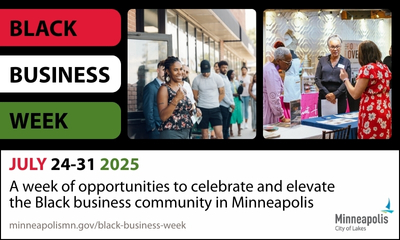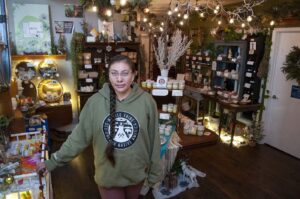
Lakota Made’s Megan Schnitker
BY DEBRA KEEFER RAMAGE
Look to indigenous ways
Although you will be reading this in December, or later, I wrote it in November, which is American Indian Heritage Month. I thought for that reason, plus the fact that the past few years has seen a great increase in availability of both knowledge and products sourced by Native people and organizations, that I would focus on local and indigenous ideas and products in the health and beauty sphere.
Minnesota is a great place to find resources for winter wellness. Native nations located here – the Lakota and the Ojibwe primarily – are working diligently to preserve their traditions for food, shelter, health care, stories, and language, among other things. This is mainly for their own physical and cultural survival, but they are happy to share wellness resources and knowledge about growing food, foraging, herbalism, and other wisdom around keeping body and mind healthy all year round.
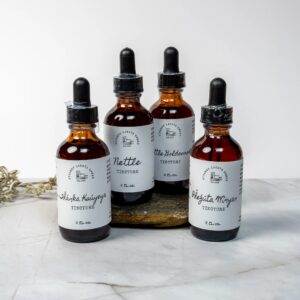
Tinctures from Lakota Made
Our resident experts – NATIFS
One of the most notable and far-reaching resources in the country is right here in Minneapolis. The Indigenous Food Lab (IFL) at the Midtown Global Market, and NATIFS, the nonprofit behind it, were co-founded by Sean Sherman, “the Sioux Chef,” most famous for his award-winning restaurant, also in Minneapolis, Owamni.
The IFL’s Marketplace sells indigenous pantry items such as dried tepary beans, frozen game and wild-caught fish, wild rice, nixtamalized corn and corn products, coffee, chocolate, maple syrup, honey, jams and sauces made from native berries and fruits, and more. They also sell herbal tea blends, tinctures and extracts, and things enriched with herbs and mushrooms. And non-food items, such as herbal soaps, balms, and oils. Everything in the Marketplace is produced by indigenous people, with most of it sourced from the heartland of North America.
The IFL Marketplace also sells prepared food and drink to take home or consume onsite. What I have done is to try out a new food or combination, then go back to the marketplace and buy the ingredients to take home and cook for myself. That was how I became a major fan of tepary beans, especially the white ones, which are so creamy and subtly flavored.
More local Native American sources
Lakota Made is a small business in Mankato founded and operated by Megan Schnitker. They sell a huge and ever-growing array of products, all produced by Schnitker and her small workforce, all based on traditional herbal knowledge she got directly from her extended family. The herbal products range from teas to brew and drink, tinctures, tonics, salves, balms, bath teas, and more. There are personal care and beauty products, dish soaps, various accessories such as for brewing tea or for your skin care routine, and then just a few items not made by Schnitker but by other relatives – star quilts and traditional jewelry. Sahan Journal wrote a piece about her and her business in 2022: tinyurl.com/DKRatSSP-LakotaMade.
Another Minnesota-based enterprise is Anahata Herbals in Duluth (anahataherbals.com.) Although Anahata does not claim to be Native owned, it is a supplier for Owamni and IFL, as they source many of their local products from indigenous suppliers. Anahata describes itself as “Minnesota Northland’s Herbal Dispensary. Nestled right here in the Duluth hillside we offer the finest organic, fair trade, wildcrafted bulk herbs, essential oils, flower essences, books, and local programs.”
They also have online sales and shipping, so you don’t have to make a trip to Duluth to sample their wares. In addition to a large selection of herbal products, they sell wild rice (wild harvested in northern Minnesota and wood-parched), chaga (a medicinal fungus), and a proprietary hot sauce called Hot Love Pepper Sauce, containing garlic scapes and habanero peppers. (Many people consider a good natural hot sauce to be essential winter wellness supplies for your kitchen.)
Farther afield…
Another supplier of herbal health products that claims to be Native American owned – but is online only with no physical address, so kind of hard to verify – is Native Botanicals. I am including them because they have one unique product that I might want to get myself this winter. You may know about the practice of smudging, a practice good for both physical health and mental health. But some people, like me, are so sensitive to smoke of any kind that they may lose some of the benefits of smudging due to allergic reactions. Other people may have serious conditions that make breathing smoke completely off limits.
Native Botanicals has a small range of products called Liquid Smudge that was developed just to fill this gap. They consist of a spray mist containing only essential oils of the herbs used in smudging: white sage, cedar, and sweetgrass in the original formula, juniper and sagebrush in the Badlands version, and simply pine and cedar in the Black Hills version. If you’re interested, you can find them at realnativebotanicals.com.
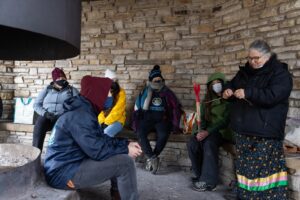
Hope Flanagan teaching foraging at Crosby
Foraging for herbs and foods
Besides buying these kinds of products, many of them can be found in the wild, even the urban wild, once you’re trained in safe foraging techniques. Fortunately, Minneapolis is a hotbed of nationally famous foragers as well. Community education, garden centers, nonprofits, food co-ops, and private foraging experts all offer short one-day classes or more in-depth teaching.
One such foraging superstar is Hope Flanagan. She works through Dream of Wild Health and its partner the Indigenous Food Network to teach foraging, among other traditional skills. Dream of Wild Health is a Native run nonprofit, their mission being “to restore health and well-being in the Native community by recovering knowledge of and access to healthy Indigenous foods, medicines and lifeways.” Read more at dreamofwildhealth.org/hope-flanagan. Seward Co-op is also part of the Indigenous Food Network, and Native herbalism, cooking and foraging are often found among their class offerings.
Four Seasons Foraging is the organizational name of Maria Wesserle, a nationally renowned foraging expert. She teaches classes through her own business and with many partners, including the American Swedish Institute (asimn.org). Check her out at fourseasonforaging.com or check the ASI website events listings for her upcoming classes.
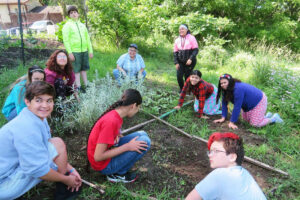
Dream of Wild Health youth gardening
Growing your own
The University of MN Four Directions Medicine Garden is a program of the University of MN’s Agricultural College Extension program. It is run by Elder June Blue and provides education in both Native American practices for gardening and traditional herbal medicine cultivation. Read more about the garden and Elder June Blue here: tinyurl.com/DKRatSSP-4DirGarden.
More resources
Explore Native American foods, medicine, and herbal traditions through books this winter. Check out Birchbark Books & Native Arts, a local Minneapolis bookstore owned by best-selling Native American author Louise Erdrich for books on medicinal herbs, gardening, and health. Products from Dream of Wild Health and other producers mentioned here can be bought at the Four Sisters Farmers Market on Franklin Avenue from late April to October.




